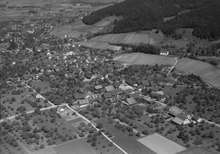Oberstammheim
Oberstammheim is a former municipality in the district of Andelfingen in the canton of Zurich in Switzerland.
Oberstammheim | |
|---|---|
 Coat of arms | |
Location of Oberstammheim 
| |
 Oberstammheim  Oberstammheim | |
| Coordinates: 47°38′N 8°48′E | |
| Country | Switzerland |
| Canton | Zurich |
| District | Andelfingen |
| Area | |
| • Total | 9.36 km2 (3.61 sq mi) |
| Elevation | 440 m (1,440 ft) |
| Population (2018-12-31)[2] | |
| • Total | 1,164 |
| • Density | 120/km2 (320/sq mi) |
| Postal code | 8477 |
| SFOS number | 0036 |
| Surrounded by | Hüttwilen (TG), Neunforn (TG), Unterstammheim, Wagenhausen (TG), Waltalingen |
| Website | www SFSO statistics |
History
In 2009, archaeologists announced the discovery of an Iron Age (late Hallstatt or early La Tène) tumulus burial, apparently of a Celtic nobleman. While there are comparable finds in Germany, the site is unique in Switzerland.[3]
Oberstammheim is first mentioned in 761 as Stamhaim. In 1212 it was mentioned as in Stamehein superiori.[4]
On 1 January 2019 the former municipalities of Oberstammheim, Unterstammheim and Waltalingen merged into the new municipality of Stammheim.

Geography
Oberstammheim has an area of 9.4 km2 (3.6 sq mi). Of this area, 54.9% is used for agricultural purposes, while 36.7% is forested. Of the rest of the land, 8.2% is settled (buildings or roads) and the remainder (0.2%) is non-productive (rivers, glaciers or mountains).[5]
The municipality is located in the Züricher Weinland on the border with the canton of Thurgau on the southern slope of the Stammerberg. It includes the village of Oberstammheim and the Zürich part of the hamlet of Wilen bei Neunforn. For a short time (1853–86) Wilen bei Neunforn, together with the Thurgau section of the hamlet, was an independent municipality.
Demographics
_dem_Gemeindehais_Oberstammheim_ZH.jpg)
Oberstammheim has a population (as of 31 December 2018) of 1,164.[6] As of 2007, 5.7% of the population was made up of foreign nationals. Over the last 10 years the population has grown at a rate of 2.4%. Most of the population (as of 2000) speaks German (97.2%), with French being second most common ( 0.7%) and Italian being third ( 0.7%).
In the 2007 election the most popular party was the SVP which received 41.1% of the vote. The next three most popular parties were the FDP (16.2%), the SPS (14%) and the Green Party (10.9%).
The age distribution of the population (as of 2000) is children and teenagers (0–19 years old) make up 28.6% of the population, while adults (20–64 years old) make up 53.5% and seniors (over 64 years old) make up 18%. In Oberstammheim about 85% of the population (between age 25-64) have completed either non-mandatory upper secondary education or additional higher education (either university or a Fachhochschule).
Oberstammheim has an unemployment rate of 0.68%. As of 2005, there were 93 people employed in the primary economic sector and about 34 businesses involved in this sector. 56 people are employed in the secondary sector and there are 13 businesses in this sector. 213 people are employed in the tertiary sector, with 34 businesses in this sector.[5] The historical population is given in the following table:[4]
| year | population |
|---|---|
| 1467 | 44 Households |
| 1637 | 359 |
| 1663 | 577 |
| 1695 | 529 |
| 1746 | 587 |
| 1850 | 989 |
| 1900 | 818 |
| 1950 | 758 |
| 2000 | 1,064 |
Transport
Stammheim railway station, situated in the neighbouring municipality of Unterstammheim, is served by Zurich S-Bahn line S29, which links Winterthur and Stein am Rhein.[7][8]
References
- "Arealstatistik Standard - Gemeinden nach 4 Hauptbereichen". Federal Statistical Office. Retrieved 13 January 2019.
- "Ständige Wohnbevölkerung nach Staatsangehörigkeitskategorie Geschlecht und Gemeinde; Provisorische Jahresergebnisse; 2018". Federal Statistical Office. 9 April 2019. Retrieved 11 April 2019.
- Fürstengrab in Oberstammheim gefunden NZZ 21 August 2009.
- Oberstammheim in German, French and Italian in the online Historical Dictionary of Switzerland.
- Swiss Federal Statistical Office accessed 28-Jul-2009
- Swiss Federal Statistical Office - STAT-TAB, online database – Ständige und nichtständige Wohnbevölkerung nach institutionellen Gliederungen, Geburtsort und Staatsangehörigkeit (in German) accessed 23 September 2019
- map.geo.admin.ch (Map). Swiss Confederation. Retrieved 2012-02-28.
- "S-Bahn trains, buses and boats" (PDF). ZVV. Archived from the original (PDF) on January 31, 2012. Retrieved 2012-02-28.